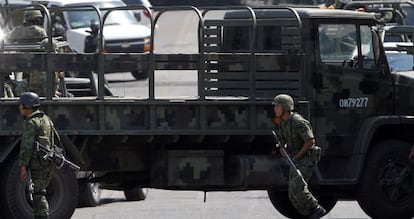Military takes to the streets
Latin America debates whether the armed forces can control soaring crime Experts believe soldiers are not prepared to assume the role of city police


Latin America is currently debating one of the biggest questions in its history: what role should the military have in the future? Discussions have become more widespread over the past several years because soaring crime rates fueled by drug trafficking have replaced military coups as the largest threat to democracy in the region.
Mexico, Honduras and Guatemala have employed their armed forces in the war against traffickers similar to what Peru and Colombia have been doing for years. Bolivia also called out the military last week to patrol four cities. Brazil is using its army to patrol the hundreds of big city shantytowns - hotbeds for traffickers and mafia leaders. The armed forces have also been useful in ensuring that law and order was maintained during the current wave of police strikes in major Brazilian cities.
Argentina has called out its own paramilitary force, the Gendarmería, to patrol Buenos Aires province after the local police force was rocked by one corruption scandal after another. But the Gendarmería hasn't been able to escape its own controversies. Recently, some of its officials have been implicated in an ongoing investigation into a spying ring that targeted politicians and labor leaders.
"Armies are trained for war. The battle against crime, especially the fight against drug traffickers, requires technology and preparation that the armed forces don't have," explains Hernán Castillo, a professor and expert in defense issues at Simón Bolívar University in Caracas, Venezuela. "To employ armies in the drug fight requires changes in their doctrines, philosophies and missions.
"That said, I think when organized criminals join armed struggles, armies should then get involved," he concludes.
But the majority of experts put special emphasis on the differences between urban and rural crime. All support military intervention in the countryside but many say it is best not to use the army in urban areas.
"Colombia has seen the most engagements when it comes to the number of illegal organizations popping up that are the products of drug trafficking and, after 47 years fighting terrorist groups, it is now clear to us that this business of drug trafficking has surpassed the police's capacities," says Michel Martínez, a retired Colombian colonel who served in the intelligence services.
"Criminal activities in areas far away from urban centers, and in border areas where security is lax, has allowed for drug traffickers to flourish. In countries like Colombia and Peru, it is impossible to fight trafficking without employing the army."
But in Mexico, Martínez says, President Felipe Calderón's decision to call out the military soon after he took office in December 2006 was an "improvised move" without any clear strategy.
"Up until now, part of that strategy has been centered on using military intelligence, infiltrations, and spying. The other part's most important objective is to remove the top cartel leaders instead of trying to dismantle them, their structures or connections," Martínez continues.
"In this initial stage, the police should be in charge of this, but the Mexican government decided to begin the fight by using its military resources, even though most of the battles are taking place in urban areas."
During a November 2010 summit of regional defense ministers - without the participation of Cuba and Honduras - military chiefs agreed to a doctrine of greater transparency in spending and increased participation in peace missions and disaster relief efforts. Issues concerning security and defense were left to be discussed at another summit.
Eliézer Rizzo de Oliveira, a Brazilian who has written several books on defense and democracy, believes military operations that involve intervening in the lives of citizens should be monitored by international organizations, such as the United Nations or Organization of American States (OAS). Also, he believes that the armed forces should also have some sort of civic-military training.
Argentina is one of the few nations that have paramilitary forces, such as the Gendarmería and the Prefectura (coast guard) - which were all based on France's Gendarmerie, the Spanish Civil Guard or the Italian Carabineros - which are involved in internal security issues but have a better image than the local police. But as the Gendarmería in Argentina finds itself enmeshed in a political spying scandal, few disagree that paramilitary forces cannot be immune to corruption. Others believe that it may be more feasible to create a special forces squad inside the military such as Brazil's Special Police Operations Battalion (BOPE), which was made famous by the 2007 movie Tropa de élite (Elite Squad).
But one Spanish commander, a veteran of the Balkans and Afghanistan missions and who is now assigned to South America, put it simply.
"In some areas in Afghanistan, they are asking us to take over police duties - especially matters that have to do with intelligence - as part of the fight against anti-insurgents. Among other things, they want us to investigate opium routes, arms trafficking and police corruption, and to be truthful if we haven't advanced in this.
"The concept of learning to eat soup with a knife came to my mind a lot of times when I was over there. The armed forces can be seen as a fork, or even a knife. But no matter how many times you stick them into a soup bowl, they will never become a spoon."
Bolivia, Venezuela deal with murders
The Bolivian government decided on Friday to deploy some 2,300 military officers on the streets of the countries' four most populous cities in an anti-crime effort to curtail the high number of murders, muggings and assaults that are taking place in urban areas.
In Venezuela, 12 police officers were arrested in the western city of Maracaibo after being charged with murder and breaking international treaties in the shooting death of the daughter of Chile's consul.
The two incidents reflect how soaring crime has become a pressing national issue in two countries.
The recent killings of two Bolivian newspaper reporters in El Alto - plus a series of crimes whose victims have been primarily women, children and the elderly - has set off a wave of protests across the poor city, located 14 kilometers from the capital La Paz. More than 10,000 rural residents marched on La Paz to demand that President Evo Morales take action. The army was sent out Friday night in La Paz, El Alto, Cochabamba and Santa Cruz.
During a public event on Friday in Cochabamba, Morales claimed that the police patrols "were not enough" to keep citizens safe.
In Venezuela, Karen Berendique, the Chilean consul's 19-year-old daughter, was riding with her brother when they reportedly approached an unmarked police checkpoint. Fearing that the stop was a hoax by thieves who wanted to rob them, the driver refused to stop and the police began to fire at them.
Neighbors in the Teotiste Gallegos neighborhood where the incident occurred on Saturday night said that at least five police officers of the 20 men discharged their weapons. Berendique died at a hospital.
Tu suscripción se está usando en otro dispositivo
¿Quieres añadir otro usuario a tu suscripción?
Si continúas leyendo en este dispositivo, no se podrá leer en el otro.
FlechaTu suscripción se está usando en otro dispositivo y solo puedes acceder a EL PAÍS desde un dispositivo a la vez.
Si quieres compartir tu cuenta, cambia tu suscripción a la modalidad Premium, así podrás añadir otro usuario. Cada uno accederá con su propia cuenta de email, lo que os permitirá personalizar vuestra experiencia en EL PAÍS.
¿Tienes una suscripción de empresa? Accede aquí para contratar más cuentas.
En el caso de no saber quién está usando tu cuenta, te recomendamos cambiar tu contraseña aquí.
Si decides continuar compartiendo tu cuenta, este mensaje se mostrará en tu dispositivo y en el de la otra persona que está usando tu cuenta de forma indefinida, afectando a tu experiencia de lectura. Puedes consultar aquí los términos y condiciones de la suscripción digital.








































